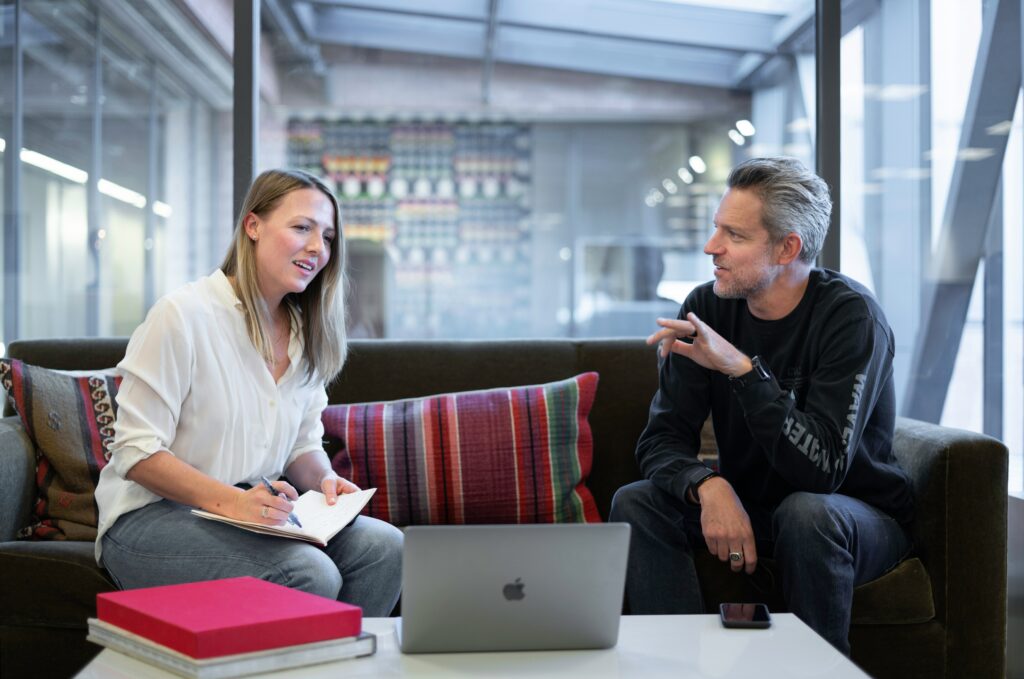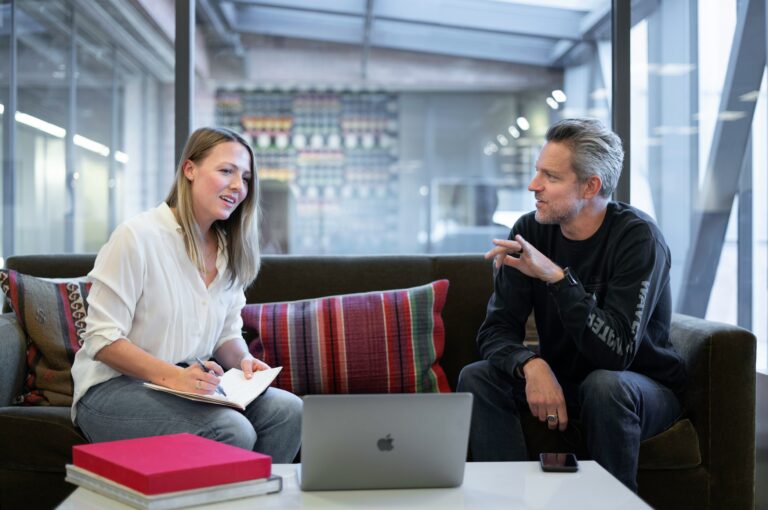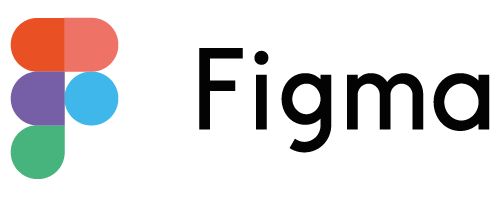Step 1. Research the Company
Go to YouTube and watch a few demo videos on the product or company. This will give you a much better understanding of the product that you’ll work with. Next, visit their website and read news articles about the company. This is a basic step but it’s incredibly important.
Step 2: Read the Job Description Thoroughly
Remember, the hiring manager wants to fill a specific role. They’ll be looking for evidence that you can step into THIS position, ramp up quickly, and stay for a reasonable amount of time.
Studying the job description is critical because it tells you what to focus on during the interview.
If you have a long career history with achievements unrelated to the position or industry, keep in mind that less is more. Sharing too much information might confuse the hiring manager or make you seem under/overqualified.
The best interviews are tailored to the ROLE.
Step 3. Prepare For These Common Questions
1. Why are you leaving your current position?
- The interviewer wants to know your reason to see if this position is a better fit. Keep things positive. Keep in mind they prefer to hire people who are running TOWARD a new opportunity because they’re excited, and not just running away from a bad situation and looking for a temporary position. If you were involved in layoffs, remember to share the number of other people who were laid off. This helps to address any concerns about it being performance related.
2. Why are you interested in this position?
- Companies want to hire people who are genuinely excited about the ROLE. This means they’ll be happy, long-term employees. Think of a few reasons why this position appeals to you.
3. What’s your plan for the next 5 years? What are your career goals?
- A company spends a lot of time, money, and effort on onboarding someone. This means they want to avoid hiring people who will leave after a short time. Thus, it’s best to connect the position or industry with your long-term career goals so that the hiring manager feels good about bringing you on. The career goals question is typically a screening question.
Bad Answers:
- “I want to work for Google in 5 years.”
- “I’m bored with Product Design and want to switch to your Product Marketing team (when interviewing for a Product Design role).”
- I want to be a Chief Product Officer in 5-years (when you’re 1-year out of school and interviewing with the Chief Product Officer)
- “I don’t really have a plan; I’m just going with the flow.” (This sounds like you have no direction and are a flight risk)
- “I’m flexible in my career. What do you have planned?” – (Sure, it’s not terrible, but it’s not great to throw the question back on them either.).
Good Answers:
- “It’s tough to say exactly where I want to be in 5 years, but I know I enjoy Product Management, so I’d like to keep growing in this field and take on new challenges. My plan is to become a subject matter expert on your product and eventually grow into a team lead position, or help in other areas, depending on what the needs of the business are.”
- “As a Director of Product Marketing, in five years, I envision myself playing a strategic role in shaping the company’s product messaging and go-to-market strategies. Right now, I’m focused on finding a FinTech company where I can drive growth and make a big impact. I’d also like to continue mentoring and developing a high performing team and stay up to date on industry trends and best practices.”
- “Right now, I’m focused on joining a growing company with an exciting product that I can get behind. I want to keep growing in Product Design of course, and maybe even lead a team someday, but I’m flexible depending on the business needs. What’s your plan for this role?”
Step 4. Prepare YOUR Questions:
The quality of your questions can make or break an interview. We’ve found that the best candidates approach interviews like skilled consultants. They ask detailed questions about the position, pinpoint the challenges, and relate their own experiences to solving those problems for the company.
By asking thoughtful questions about the POSITION or company – you’re not only learning more about the role, but you’re also demonstrating that you know what you’re talking about. A win win!
Try to limit generic questions. People early in their career will often ask generic questions because they don’t have enough experience or don’t know what else to ask. Generic questions don’t leave a lasting impression or convince the hiring manager that you understand the position.
Here are examples of generic questions to limit during a first-round interview:
- Why do you like working here?
- How long have you been working here?
- What’s the company culture? (This is important but subjective. Don’t neglect higher quality Qs.)
- What does the company do? (You should already have an idea.)
- Who are your main competitors? (You should already have an idea.)
- How much does this position pay? (You should already have an idea.)
Here are examples of strong general questions:
- Who does this report to, and what’s the team structure?
- What’s the company’s tech stack?
- How does your remote team stay organized?
- Why is this position open?
- I saw that you recently acquired company XYZ. Do you have other acquisitions planned?
- Does the company want to stay privately held, IPO, or get acquired? What’s the plan?
Here are examples of strong position specific questions:
- Product Management:
- What stage of growth is this product currently in?
- Do you have an existing roadmap for this product that you want me to execute on?
- Do you have any technical debt?
- How many Engineers are on the team? Where are they based?
- Do you have a Product Design team that I’ll work with?
- How is success measured for Product Managers?
- How is user research conducted?
- What are the biggest challenges facing the product team currently?
- Product Design:
- How many designers are on the team currently?
- Do you have a dedicated usability testing and user research team?
- What design tools do you use?
- Will I be designing a web-application, mobile app, or desktop client?
- Do you have an existing design system?
- How do you prioritize design projects and balance competing demands?
- Product Marketing
- What are the main channels that the company uses for product marketing?
- What’s the relationship between Sales and Product Marketing?
- How is product messaging developed, and how involved is the Product Marketing team in this process?
- What KPIs do you track?
- How often do you launch new products?
- How do you communicate product updates and feature launches to existing clients?
- How do you measure success on the Product Marketing team?
- Product Analytics
- What data sources and tools do you currently use?
- How involved is the Product Analytics team in the product development process?
- How do you ensure data accuracy and consistency across different product features?
- What are the key metrics you track for product performance and user behavior?
- How do you collaborate with other teams (Product, Design, Engineering, Marketing) to drive data-informed decisions?
Things to Keep in Mind:
- Be specific and detailed with your experience and examples. It’s important to get into the specifics of HOW you accomplished something. The most common feedback we get about unsuccessful candidates is that they spoke at too high-level about their past experience.
- Keep things positive and show a genuine interest in the role and/or person.
- Strongly recommend sending a thank you email after the interview. Short and sweet is fine but be careful with grammar and spelling. This step has become uncommon with remote interviews but hiring managers value it and comment on it often. It also demonstrates a genuine long-term interest in the position and will increase your chance of getting an offer.











